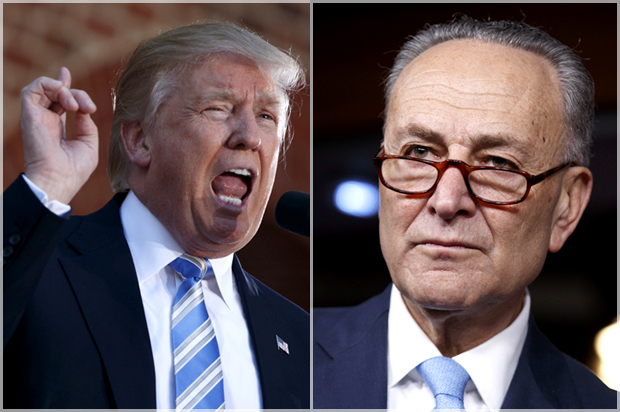WASHINGTON — Add a potential government shutdown to embattled President Donald Trump’s growing roster of headaches.
Beneath the capital’s radar looms a vexing problem — a catchall spending package that’s likely to top $1 trillion and could get embroiled in the politics of building Trump’s wall at the U.S.-Mexico border and a budget-busting Pentagon request.
While a shutdown deadline has a few weeks to go, the huge measure looms as an unpleasant reality check for Trump and Republicans controlling Congress.
Despite the big power shift in Washington, the path to success — and averting a shuttering of the government — goes directly through Senate Democrats, whose votes are required to pass the measure. And any measure that satisfies Democrats and their new leader, Sen. Chuck Schumer of New York, is sure to alienate tea party Republicans. Trump’s determination to build his wall on the U.S.-Mexico border faces a fight with Democrats, too.
For now, the new Democratic leader is cautious.
“We’ll have to wait and see what happens,” Schumer said. “I hope they won’t jam up the supplemental (spending bill) with poison pills.”
At issue is the annual must-do legislation funding government agencies and departments. The path for the huge spending measure — by Republicans’ own choice a piece of leftover business from last year — would be difficult and complicated in a smoothly running Washington. But partisanship has engulfed the city, and the upcoming measure is made even more challenging once upcoming Trump requests for $18 billion or more for the Pentagon and money for his contentious border wall are added to the mix.
For years, Republicans needed President Barack Obama’s signoff and relied on Democratic votes to pass the measures and balance out opposition from tea partyers.
Trump’s election has shifted the balance of power in Washington, but the GOP’s grip on the Senate — where 60 votes are needed for most legislation — is actually weaker. Some House conservatives are demanding a round of budget cuts to “offset” new spending on the Pentagon and Trump’s wall.
“If all of a sudden we’re not worried about pay-fors for our spending, then we have been hypocrites,” said tea party Rep. Raul Labrador, R-Idaho. “I’m not going to vote for anything that just increases spending without looking for a way to pay for that in the future.”
That’s far easier said than done, especially with the budget year nearly half over. Democrats might accept the Pentagon funding — aimed at reversing what Pentagon hawks see as a slide in military readiness and procurement — even though it would unravel a hard-won 2015 budget pact. But they won’t stand for cuts to domestic programs to pay for it, and neither will more pragmatic Republicans.
“I don’t think we’d be able to jam anything through that didn’t have some significant buy-in by Democrats,” Sen. Roy Blunt, R-Mo., said.
Lawmakers face an April 28 deadline, which seems like plenty of time. The administration, however, is off to a slow start, just last Wednesday winning Senate confirmation of its budget director, Mick Mulvaney, who has his hands full with Trump’s broader budget submission for the upcoming year as well as plans for the supplemental Pentagon spending or the border wall
It’s all complicated by the tumult surrounding Trump’s presidency, including his low approval ratings and vehement opposition from rank-and-file Democrats still stinging from Trump’s upset victory and his provocative travel ban.
GOP leaders like House Speaker Paul Ryan of Wisconsin are eager to avert any shutdown. The most recent one, caused by House Republicans, came as tea party lawmakers insisted on a failed strategy of using shutdown threats as leverage to try to block implementation of Obama’s health care law.
An end-of-April shutdown still seems unlikely. Neither Republicans nor Democrats want that. But a stumble is possible if Senate Democrats filibuster the measure over budget additions like the border wall with Mexico.
And in the House, dysfunction is always possible, especially if conservatives shun the measure as they have with previous bipartisan versions of spending bills. That led top leaders like then-Speaker John Boehner, R-Ohio, to turn to House Democratic leader Nancy Pelosi, hat in hand, to get enough votes. Now, with Trump in the White House, House Democrats can’t be counted upon to help.
“If they need Democratic votes, because some of their people will vote for nothing, as you well know, then we’ll have to talk,” Pelosi said. “But I fear that if they don’t need Democratic votes, the product would be something very horrible for the American people.”
And there’s still the Senate, where Republicans hold a 52-48 edge, short of filibuster-proof 60.
“So it doesn’t mean just because (Republicans) have a majority in the House, a majority in the Senate and now the White House that we can do anything we want,” Rep. Mike Simpson, R-Idaho, said.


